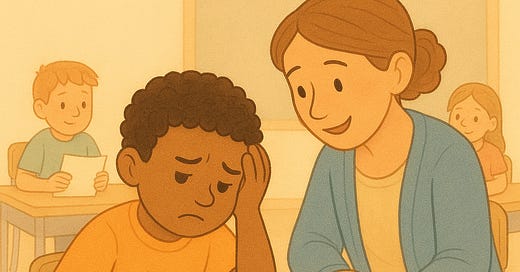Miles from the Middle: A Story About Dyslexia
A story about discovering dyslexia, understanding your brain, and finding your way forward.
Miles always sat in the middle row.
Not in the front—where it felt like everyone could see him squint and stumble when he had to read aloud.
Not in the back—where it was too easy to disappear and pretend he wasn’t falling behind.
The middle felt safest. Like maybe he could blend in.
But lately, even the middle felt loud.
The words on his page danced like they were part of a secret game.
Letters flipped, twisted, and slid away when he tried to sound them out.
Sometimes the b looked like a d. Sometimes the p looked like a q.
Sometimes it just all looked like a messy scribble, even when he tried really, really hard.
When the teacher called on him in reading group, Miles’s stomach dropped.
He’d hold his breath and start reading.
But the words moved too fast—or maybe he moved too slow.
He mixed things up. He skipped lines.
His cheeks burned. He could feel the quiet eyes of the class.
And even though no one laughed, Miles felt a little smaller every time.
After class one day, his teacher knelt beside his desk.
“Miles,” she said gently, “I’ve noticed how hard you’re trying. I wonder if something’s getting in the way.”
Miles nodded slowly, blinking back the lump in his throat.
“I think we should look into how your brain processes words. Brains are all different, and sometimes we need to find the way yours learns best.”
A few weeks later, after meetings, assessments, and lots of waiting, Miles’s mom sat beside him at the kitchen table.
She looked both serious and proud. “Miles, we have some answers. You have something called dyslexia.”
Miles frowned. “Is that… bad?”
“No,” she said quickly, squeezing his hand. “It just means your brain reads and writes differently. It’s not wrong—it’s just a different way of learning.”
“Different how?” he asked.
“Your brain is really good at seeing the big picture. You might notice patterns others miss. You probably think in pictures more than words. But when it comes to decoding letters and sounds, your brain takes a different path.”
His teacher explained it again at school:
“You’re not behind. You just need different tools to get where you’re going.”
At first, Miles wasn’t sure how to feel.
Was this supposed to make him feel better?
He still couldn’t read fast. He still couldn’t spell “together” without mixing up the letters.
And he still had to work harder than most of his classmates.
But something shifted.
Instead of feeling broken, he started to feel… seen.
The school gave him special colored overlays that made the letters stop wiggling.
He got to use audiobooks during reading time.
A reading tutor came twice a week and showed him fun, weird ways to remember tricky words—like how “friend” had a little “end” in it, because friends stay until the end.
He even got extra time on tests.
“It’s not cheating,” his mom reminded him again. “It’s giving your brain a fair shot.”
One afternoon, the class was invited to read a poem out loud—just a few lines each.
Miles wanted to say no. He almost did.
But then he remembered what his tutor said:
“Courage doesn’t mean never being scared. It means doing it anyway.”
He practiced for days. Reading slowly. Pausing for the commas.
Breathing deep.
When it was his turn, he stood. His voice wobbled a little at first.
But he didn’t rush.
He didn’t skip.
He read.
And when he sat back down, his classmates smiled.
Not because it was perfect.
Because it was brave.
Later that week, his teacher called him up after class.
“I want to show you something,” she said, pointing to a bulletin board.
It was a wall of inventors, artists, scientists, and writers—all of whom had dyslexia.
“Sometimes the most creative thinkers just need to approach things from a different angle.”
Miles stared at the pictures. There was Albert Einstein. There was Agatha Christie. There was someone who invented the first voice-to-text app.
His teacher smiled. “See? You’re in good company.”
That night, Miles opened his reading journal and wrote a note to himself:
“Just because my path is winding doesn’t mean I’m lost.
I’m not stuck in the middle.
I’m making my own way forward.”
And he drew a little compass in the corner of the page—just to remind himself he’s going exactly where he’s meant to go.
🔹 Family Reflection Question
What does “different, not less” mean to you?
Can you think of a time when doing something in a new or different way helped you learn better?
🎬 Practice Activity: Brain Compass
Create a "brain compass" together.
Draw a circle and divide it into four sections. Label each one:
One thing your child is good at
One thing that feels tricky
One support or tool that helps
One dream or goal they have
Decorate the compass and post it somewhere visible to remind them that their direction is their own—and they’re not lost, just learning differently.



